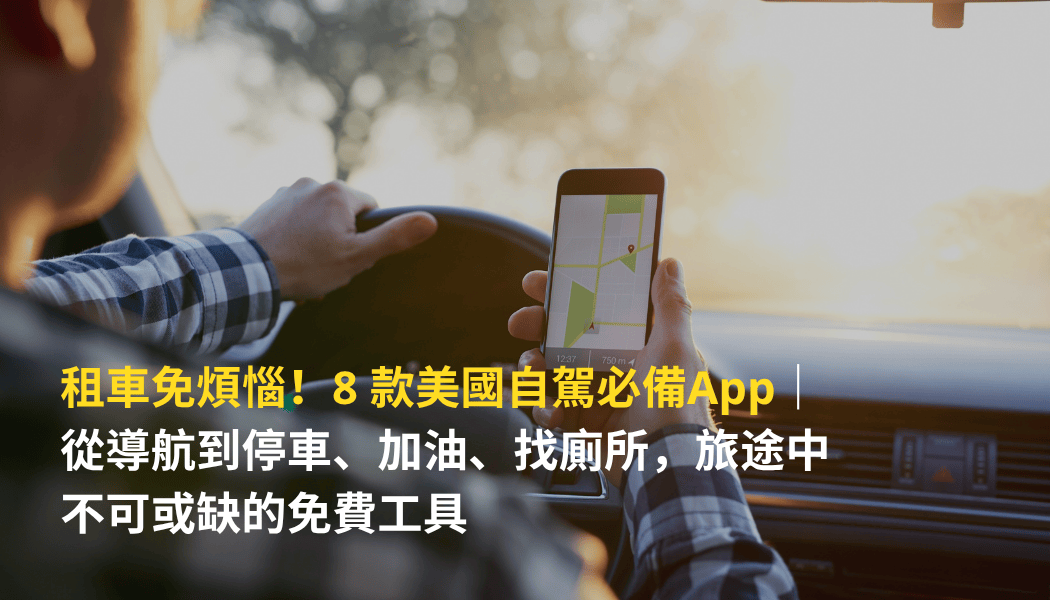The U.S. is a vast country, especially in California, and a road trip with a rental car is definitely the first choice for exploring national parks and visiting cities and towns. However, driving in the U.S. is a bit different from Taiwan, and there are some procedures and regulations that you need to pay attention to when renting a car. This article provides basic U.S. car rental tips, covering the regulations and procedures, how to protect your property and personal safety, as well as traffic rules that are different from those in Taiwan and require special attention. This article provides basic tips on how to rent a car in the U.S., including rules and procedures, how to protect your property and personal safety, and transportation rules that are different from those in Taiwan and require special attention!
U.S. Car Rental Tips: Rental Procedures and Regulations
Car Rental Procedure

Generally speaking, the process of renting a car in the United States is as follows: Book a car online > Go to the pick-up store at the booking time and confirm with the rental company > Sign the insurance and payment > Confirm the appearance of the car and the gas meter. At the end of the trip, drive back to the return store to confirm the condition of the vehicle, and then you can leave. The subsequent bill will usually be charged directly to the pre-authorized credit card.
However, if you choose to rent a car from Sky Horse, you can save yourself the time of traveling to a store or finding an airport rental location, and have your car rental partner meet you at the airport terminal or at a designated location in your hotel to pick up your car.
Car Rental Requirements
1. Age requirement for renting a car
Most U.S. car rental companies require the renter to be at least 21 years of age, and some require the renter to be at least 25 years of age, with a few renting to drivers over 18 years of age. Rental car companies charge drivers under the age of 25 a young driver fee ranging from US$$20 to US$$40, which is usually collected at the counter and not at the time of booking.Sky Horse accepts rentals from travelers over the age of 21 for a surcharge of US$$19 per day, which is shown in full at the time of booking.
2. Passport, Taiwan Driver's License and International Driver's License
The renter must have a valid passport to verify his/her identity and provide a valid Taiwan Driver's License* and an International Driver's License to rent a vehicle. International driver's license must be valid after the return date. *Note: Valid Taiwan Driver's License: The original valid Taiwan Driver's License is required (even though Taiwan Driver's Licenses do not need to be renewed at this time, if the validity date of the license has expired, the license must be renewed at the time of International Driver's License issuance).
3. Rental car insurance
U.S. car rental companies usually offer a variety of insurance options, the two main ones being:
- Collision Damage Waiver (CDW): Collision and Theft of Leased Vehicles
- Third Party Liability Insurance (SLI): Various amounts of damages against a third party for damage to a vehicle and bodily injury.
Other insurance policies include roadside assistance, tires and windows, business loss, and damage to the contents of the car. Some car rental companies do not include insurance in their website prices, so you need to pay attention to the cost details and check the insurance coverage and terms when renting a car.
4. Booking of vehicles
Most U.S. car rental chains offer online booking, which is not only convenient, but also allows you to confirm the car model and cost in advance, especially in busy rental locations such as airports, or during peak travel seasons, so that you can avoid the situation of needing a car that is not available. As a reminder, some large U.S. car rental companies will take the car that is available on-site, and may not always have the car that is reserved online, or may have to wait for the customer to return the car before they have a chance to choose. It is advisable to allow some buffer time on the day of rental to avoid disruption to your itinerary.
5. Vehicle inspection
When picking up and returning the vehicle, remember to carefully inspect the exterior, interior, mileage and fuel gauge of the vehicle, take photographs or videos to record any existing damages and mark them on the rental agreement to avoid disputes when returning the vehicle.

6. Refueling
Most rental cars in the United States require that the gas gauge be topped up to the amount you picked up before returning the car. If it is less than the amount you left the car with, you will be charged extra for gas and labor. Usually the rental car will have an indication of what kind of gas is needed near the gas hole, or you can ask the staff when you return the car.
7. Toll roads
Freeways in the United States are divided into tolled and tolled sections. You can either rent an electronic toll collection machine from a rental car company or have it deducted directly by the rental car company at the end of your trip. Some sections of the highway allow you to pay by cash, while others allow you to pay online within a certain period of time, and the rules vary from state to state. If you want to avoid being charged, select "Avoid Toll Roads" on Google Maps. In the case of Sky Horse, each car can pass directly through the toll road, and the system will automatically charge your credit card and send you an email with the details within 7 to 10 days.
U.S. Car Rental Tips: Property and Personal Safety
Security in the U.S. is not as good as in Taiwan, so whether you are in the city or in the country, you need to pay special attention to your own safety and financial security. However, you don't need to worry too much, refer to the following four suggestions, try to avoid giving criminals an opportunity to take advantage of the situation, and then you will be able to enjoy a more secure and enjoyable trip.
1. Parking Options
Choose a parking lot or parking space that is brightly lit, has high traffic flow, is managed, and has a camera monitoring direction. When getting in and out of your car, watch out for any suspects hanging around. Don't park in remote parking lots, dark alleys, or remote corners where no one is around just to save money. Knocking on cars is usually very fast, so try to make it as difficult as possible, for example, park in the middle of two cars to greatly increase your safety.
2. Custody of personal effects
Remember, when leaving the car, do not leave valuables in the car, or leave any personal belongings, including backpacks and suitcases, in plain sight. Even if there are no valuables inside, they may easily become a target for knocking on the car, which is not worth it. It is advisable to leave your luggage at a hotel, at a pay locker in the city, or in the back of the car when you leave the hotel, so that you do not have to pick up your belongings in public again.
If you are traveling to the countryside or national parks, you may not have to worry too much. Most car thefts occur in urban areas, but you should still carry your valuables and important documents with you.
Rumor has it on the internet that you should cover up the back of the car with a black cloth or baffle to avoid being knocked on the window, however, doing so will increase the risk of burglars thinking there are valuables inside the car that are worth knocking on.
3. Doors and windows
Lock the doors and windows of the car as soon as you have boarded the car, and be sure to close the windows and lock the car even if you are leaving for a short period of time after getting off the bus.
4. Choice of stops
When traveling by car, you will need to take short breaks for rest, meals, and toilets. You can go to large rest areas, such as Taiwan's highway rest stops, or fast-food restaurants near highway interchanges, such as McDonald's, Taco Bell, and Starbucks, or official visitor centers, such as the national park's Visitor Center. Official visitor centers, such as the Visitor Center in national parks. If you are driving through some small towns, please pay special attention and observe the situation before deciding whether to stop. For example, a lot of broken glass on the ground of the parking lot may mean that there are many car knocking incidents, and a lot of closed stores may mean that the town is no longer in normal operation, and then the crime rate will be relatively higher.
U.S. Car Rental Tips: Transportation Rules

- Speed limit compliance
Watch for state and roadway speed limit signs. Most highways and interstates have speed limits of 55 to 75 miles per hour (88 to 120 kilometers per hour), and urban roads generally have speed limits of 25 to 35 miles per hour (40 to 56 kilometers per hour). Follow the speed limit, but try not to drive too slowly, judging by the traffic around you.
- Traffic Signal
Traffic signs in the U.S. are similar to those in Taiwan, with the same stop-on-red and green-on-green signals, but the difference is that if there are no special instructions, you can make a right turn on a red light, but you must come to a complete stop in a stop line before you can make a right turn. In some roads, you need to wait for a special light signal to turn right or left.
- Zero tolerance for drunk driving
Do not drink and drive in the U.S. If you are stopped and found to be driving under the influence of alcohol, you may be arrested, regardless of whether the concentration exceeds the prescribed 0.08%. Of course, you cannot drive after smoking marijuana.
- Stop Sign
When you see a stop sign, your vehicle must come to a complete stop. If you are at an intersection, the car that stops first goes first, even if you are the second car, you need to stop and start when you come to the intersection.
- Cell Phone Usage
The use of cell phones while driving is prohibited, whether for talking on the phone, sending messages, playing handheld games, or watching movies.
- Buckle up.
All passengers must wear seat belts, both in the front and in the back. Failure to wear a seat belt may result in a fine and increased risk of injury.
- Steering lights, lane change
Not every state requires you to use your turn signal when changing lanes, so it's important to keep a safe distance and speed limit, and you can't change lanes or overtake on double yellow lines. If you see a double yellow line that is solid on the outside and dotted on the inside, it is a left-turn lane and should not be used for passing.
- When stopped by the police
If you are followed by a police car with flashing lights and sirens, please drive safely to the shoulder of the road and stop. Do not get out of the car, keep your hands on the steering wheel, and wait for the police officer to come to the window of the car to signal, then lower the window of the car. The police will usually need to confirm your driver's license and rental agreement, and tell you the reason for the stop. In the case of tourists, most of the stops are for speeding violations, and sometimes the police will give you a verbal warning, and sometimes they will issue you a ticket, so you don't need to be too nervous, and you should just respond politely.
U.S. Car Rental Tips Conclusion
Renting a car in the U.S. brings a lot of novelty and freedom to the journey, but at the same time, you need to understand the local car rental regulations and traffic rules, and pay extra attention to safety, so that you can have a peace of mind and enjoyable journey. Sky Horse provides "U.S. Self-Driving Companion Handbook" for Taiwanese travelers to the U.S., as well as the reliability and warmth of the whole process of accompanied by the Chinese language, from the booking of the vehicle, to the delivery, to the return of the car payment, everything is clear and transparent. From the booking of the car, to the delivery of the car, to the return of the car and the payment, everything is clear and transparent. Even if you encounter any unexpected hiccups during your trip, we are always ready to reply and lend you a helping hand to make sure that your trip goes smoothly and that you enjoy your U.S. vacation to your heart's content!
🎉 2025 Car Rental Rebate [ sh2025 ] Offer is counting down!🎉
Days
Hours
Minutes
Seconds


